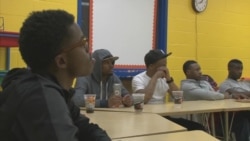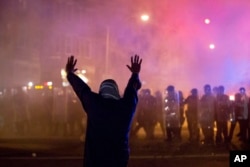Days of violence engulfed Baltimore, Maryland one year ago. The outbreak of unrest was sparked in part by the death of Freddie Gray, a young African American who suffered fatal injuries while being transported in a police vehicle. Six Baltimore officers face charges resulting from his death and are awaiting trial. A year later, efforts are underway to improve strained relations between police and young people in the city.
The wrongful arrest and death of 25-year-old Freddie Gray exposed what many Baltimore residents called a long-history of deadly police encounters with young African Americans.
A year later, Baltimore Schools Acting Police Chief Akil Hamm takes part in a classroom session about creating mutual respect.
"So if you have heard of customer service when you go into a store. Have you ever been to Chick-fil-a Restaurant ? When you go in there they are nice they are courteous. That's what we are trying to do with our police officers. So we are providing different training to help us better deal with young people because let's just be honest there are a lot of issues in our city, there is a lot of violence," said Hamm.
Hamm and other mentors meet with students as part of a program aimed at improving community relations.
"They might get some more respect but we don't get any loyalty from them [the police],” said one student.
“No loyalty, that's a good point, no integrity," said a teacher.
Students offered suggestions on how they think the police can do a better job.
"Train better because if you run into somebody such as myself who knows what he is doing it is automatically going to turn into deadly force because they are not going to be able to hold me down,” said one student.
"There are a lot of young brothers that look like you that have bad interactions with the police,” noted Hamm.
Hamm is teaching young people how to survive encounters with the police.
""It doesn't really make sense to keep going back and forth with them (the police officer) because you want to survive that stop and be able to make that complaint," said Hamm.
Some students also dramatized how they were treated by police.
Other young people find it hard to trust the police because of how they were treated. Many students are leery of the police because of incidents such as the 2016 school confrontation described by a female student.
"He [the police officer] twisted my arm behind my back and threw me," she recalled.
"They think just because they want you in the office for fighting they are going to grab you and drag you out the class and beat you up on the way to the office," added a male student.
"When we [police officers] come into a situation, we want to defuse it we don't want to inflame it. So if you [young people] are already upset it is not going to do any good to come in and make the situation worse," said Hamm.
Hamm hopes more dialogue will lay a stronger foundation to build better relations between the police and the community they are sworn to protect.






